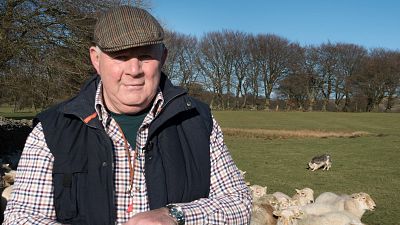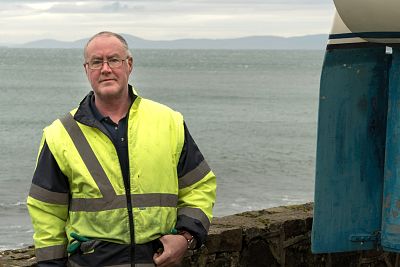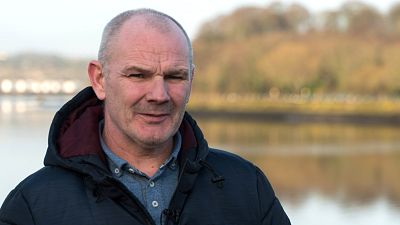With the departure deal in disarray, NBC News set out to to uncover the hopes and fears in the four corners of the U.K.
MANMOEL, Wales — On a frosty hillside, William Jenkins blows his high-pitched whistle and barks instructions at two dogs as they round up a flock of unruly sheep.His family have worked the land here since 1911, and their rough-hewn farmhouse dates to the 1640s. Like his father and grandfather before him, Jenkins, 69, has faced almost every challenge, from harsh Welsh winters to constantly changing prices for his livestock.But nothing has worried him quite like the U.K.'s impending exit from the European Union — the seemingly unsolvable riddle that is Brexit.
 ADVERTISEMENT
ADVERTISEMENT
 ADVERTISEMENT
ADVERTISEMENT
"I've got to be honest, politicians of all colors are playing political games with our future and it frightens me what is going to happen to us," he says, squinting into the low, wintry sun.According to Jenkins, the E.U. has given farmers "stability and security."More than two and a half years after Brits voted in a referendum to leave the E.U., and with only 49 days to go until the divorce is due to come through, the country's politicians still haven't agreed how to make this work. NBC News embarked on a road trip to speak with regular people around the country about their hopes and fears for the future.If they can't agree on something by March 29, Britain will face a "no-deal" Brexit, risking shortages of food and medicine, chaos at the borders and conflict in Northern Ireland.With much of the debate centered around Parliament, we wanted to escape the "Westminster bubble" — the British version of the so-called Washington Beltway.We traveled 1,200 miles by car, train and airplane, visiting both pro-E.U. and "leave" heartlands in each of the U.K.'s four nations: England, Wales, Scotland and Northern Ireland.We met Jenkins, the Welsh sheep farmer, while visiting Blaenau Gwent, the county in Wales with the highest percentage of voters who supported quitting the 28-country bloc in the 2016 referendum.
World news
As one of the poorest parts of Europe, Wales receives hundreds of millions of dollars each year in E.U. funding. And yet most people here voted to leave.Many complained that despite the influx of cash, it was being spent on new highways and urban face-lifts, rather than things that might immediately improve their lives. This once mighty industrial region is blighted by unemployment and rust-belt isolation.As a pro-E.U. remainer, Jenkins goes against the grain of his community and says he's "baffled" by the vote.On another leg of the trip, we found his polar opposite in the Northern Irish coastal town of Ballycastle."Westminster has lost touch with the people and they have lost touch with democracy," said dock worker David Henry, 59, speaking about the lawmakers at the Parliament in London.
"We voted leave, overwhelmingly, to get out of Europe — and we want out," he added, referring to the 17.4 million people across the U.K. — or 52 percent of voters — who supported departing.Although the majority of Northern Ireland voters — 55.8 percent — wanted to stay in the E.U., Henry lives in North Antrim, the area with the region's strongest leave vote. Like many, his main concern is immigration — "the flood of cheap, foreign labor coming into this country."Northern Ireland has become a major sticking point for Brexit. It was plagued for 30 years bysectarian strife called "the Troubles." A 1998 peace deal rested on an open border between Northern Ireland and the Irish Republic. Some worry Brexit could mean the return of a "hard border," and with it violence.Henry dismissed these fears as "lies and propaganda bred by people who want to remain."Special report
But in Londonderry, also known as Derry, we found a different view. It lies miles from the border with the Irish Republic, which will remain part of the E.U., and would be on the front line of any tension post-Brexit."There were bombs or shootings at least four or five times a week," said Gavin Morrison, 46, recalling growing up during the Troubles and working for a window firm."We put in a lot of panes of glass on a Friday," he said near the city's E.U.-funded Peace Bridge. "There was another bomb on the Sunday that blew them out again, and we had to replace them again on the Monday."
Londonderry is in the parliamentary constituency of Foyle, which boasted the highest level of support for staying in the bloc of any place outside of London.We found a similar sentiment in Scotland, where 62 percent of voters backed staying in the E.U.Jamie McCormack, 37, a chef, told us over a pint in Edinburgh that he was angry at being "dragged out of the European Union" as a result of votes that came mostly from England."My country did not vote to come out of the European Union," he said. "England took us out; we didn't vote for this."Another stop was the English town of Boston — which is where the Massachusetts city got its name. The U.K.'s version happens to be the Brexit capital of the U.K., where almost 80 percent of residents voted to leave the E.U. Many were motivated by a spike in immigration from Eastern Europe after 10 new countries joined the bloc in 2004."It was such a stable community for such a long time before the introduction of free movement," said Alan Mason, 69.He wouldn't say how he voted in 2016, and he denied that anti-immigrant sentiment was a cover for thinly veiled racism. He told us he understood why people were upset that the "character" of the town had changed so quickly.Others weren't so measured. While we were filming in the main square, a man shouted to us, "Send them all back home," referring to the town's migrant population.World news
It's no surprise Britain is divided over Brexit. But we found surprising shades of gray.In the town of Lossiemouth, on Scotland's freezing north coast, Sandra Campbell, 64, admitted that in 2016 there wasn't enough information "for people to come to a proper decision" on the referendum.And even in the pro-E.U. stronghold of Lambeth in South London, management consultant Simon Sandberg, 61, recognized there could be "a political crisis" if the result were overturned.That didn't stop him from adding one hopeful caveat, with a glint in his eye."Well, I'm not sure we are about to leave the European Union," he said, amid speculation that the parliamentary gridlock in London might prompt another referendum on the issue. "That's still up for grabs."













